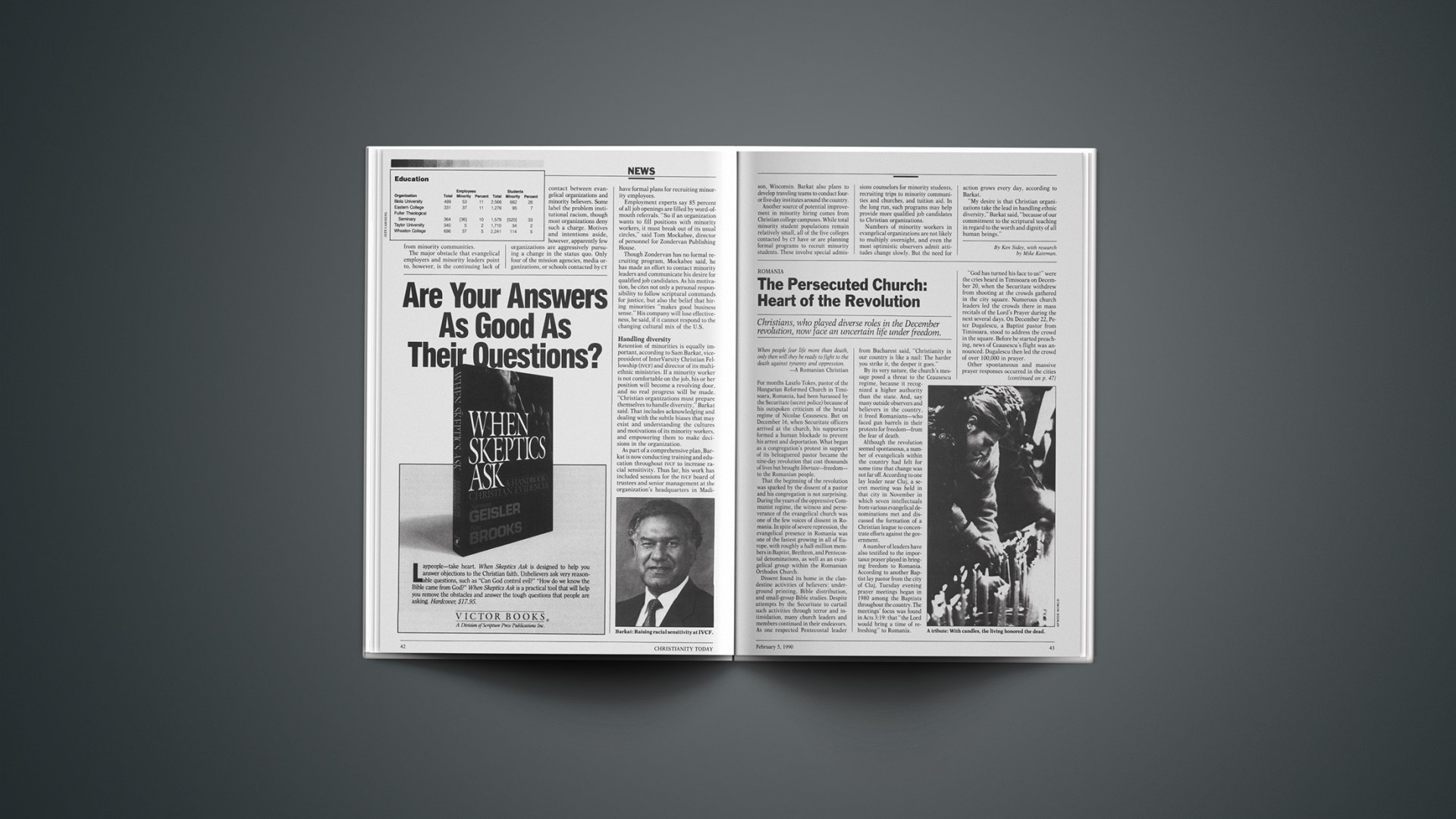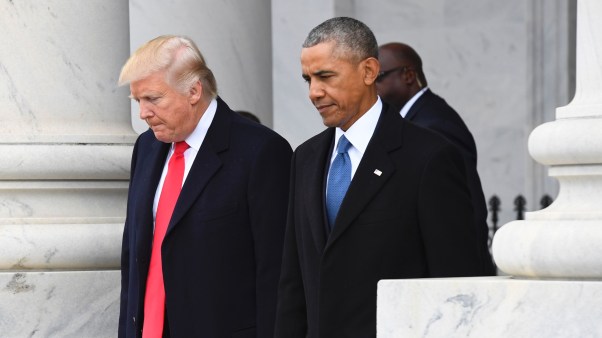Christians, who played diverse roles in the December revolution, now face an uncertain life under freedom.
When people fear life more than death, only then will they be ready to fight to the death against tyranny and oppression.
—A Romanian Christian
For months Laszlo Tokes, pastor of the Hungarian Reformed Church in Timisoara, Romania, had been harassed by the Securitate (secret police) because of his outspoken criticism of the brutal regime of Nicolae Ceausescu. But on December 16, when Securitate officers arrived at the church, his supporters formed a human blockade to prevent his arrest and deportation. What began as a congregation’s protest in support of its beleaguered pastor became the nine-day revolution that cost thousands of lives but brought libertate—freedom—to the Romanian people.
That the beginning of the revolution was sparked by the dissent of a pastor and his congregation is not surprising. During the years of the oppressive Communist regime, the witness and perseverance of the evangelical church was one of the few voices of dissent in Romania. In spite of severe repression, the evangelical presence in Romania was one of the fastest growing in all of Europe, with roughly a half-million members in Baptist, Brethren, and Pentecostal denominations, as well as an evangelical group within the Romanian Orthodox Church.
Dissent found its home in the clandestine activities of believers: underground printing, Bible distribution, and small-group Bible studies. Despite attempts by the Securitate to curtail such activities through terror and intimidation, many church leaders and members continued in their endeavors. As one respected Pentecostal leader from Bucharest said, “Christianity in our country is like a nail: The harder you strike it, the deeper it goes.”
By its very nature, the church’s message posed a threat to the Ceausescu regime, because it recognized a higher authority than the state. And, say many outside observers and believers in the country, it freed Romanians—who faced gun barrels in their protests for freedom—from the fear of death.
Although the revolution seemed spontaneous, a number of evangelicals within the country had felt for some time that change was not far off. According to one lay leader near Cluj, a secret meeting was held in that city in November in which seven intellectuals from various evangelical denominations met and discussed the formation of a Christian league to concentrate efforts against the government.
A number of leaders have also testified to the importance prayer played in bringing freedom to Romania. According to another Baptist lay pastor from the city of Cluj, Tuesday evening prayer meetings began in 1980 among the Baptists throughout the country. The meetings’ focus was found in Acts 3:19: that “the Lord would bring a time of refreshing” to Romania.
“God has turned his face to us!” were the cries heard in Timisoara on December 20, when the Securitate withdrew from shooting at the crowds gathered in the city square. Numerous church leaders led the crowds there in mass recitals of the Lord’s Prayer during the next several days. On December 22, Peter Dugalescu, a Baptist pastor from Timisoara, stood to address the crowd in the square. Before he started preaching, news of Ceausescu’s flight was announced. Dugalescu then led the crowd of over 100,000 in prayer.
Other spontaneous and massive prayer responses occurred in the cities of Oradea and Constanta. In Cluj, a group of Christian youth went to the train station to sing Christmas carols on Christmas Eve. When they arrived at the train station, another spontaneous prayer meeting took place. With the sound of shooting in the city square in the background, everyone at the station knelt in prayer for the country.
Handling Newfound Freedoms
Throughout the 1970s, Baptist pastor and teacher Josif Tson challenged the Romanian government’s interference in religious affairs. After being arrested in 1974 and again in 1977, he was exiled from the country in 1981. Now president of the Wheaton, Illinois-based Romanian Missionary Society, Tson returned to his homeland for two weeks in late December and January. He spoke with CHRISTIANITY TODAY by phone from Bucharest.
How are believers reacting to their new freedoms?
Everybody was absolutely surprised and stunned by such sweeping and radical change. As I arrived on a Saturday morning and embraced my successors [at Second Baptist Church of Oradea], one of the first questions they asked was “What do we do tomorrow?” Thousands of people wanted to come to the church, where they have only a thousand seats. So I said, “What about the sports stadium?” It just couldn’t be imagined that [using the stadium] would be possible. They went [to the authorities], and in a few hours they came back with a deal.
So on Sunday, we united the Baptist church and the Pentecostal church, and we had about 7,000 people in the service. In the evening service we had about 10,000 people.
There are many initiatives under way. One is the decision to create a National Association of Evangelicals. Baptist, Pentecostal, Plymouth Brethren, the Lord’s Army [evangelicals within the Orthodox Church] are all very much interested in this, and we hope that it will be formalized soon.
What are the effects of freedom on the denominations you mention?
All of these denominations have to reorganize. They have to change their statutes, constitutions, and leadership from what was imposed on them by the Communist government.
Is a new leadership emerging?
We praise the Lord for the fact that since the mid-1970s, Romanian Christians were aided quietly by groups such as the Navigators and Campus Crusade. The Romanian Missionary Society helped provide theological education by extension to about 1,200 students all across Romania in all the evangelical denominations. So today there is a new generation of young leaders.
Previously, many young people couldn’t take over the work in the churches because of the old pastors who were kept there by the Communist government against the wish of the church. Many churches are now in the process of organizing new elections to replace the old pastors.
Have you taken part in any of the political reform under way?
There is an attempt to put together a Christian Democrat party. I took an active part in some of the initial discussions about the nature of the party and its main policies and political platform. I introduced some articles regarding the place of religion in the society, and they were well received. Specifically, what I proposed was the right to start private schools and church schools, which didn’t exist before.
There was long discussion on the place of religion in schools. Society by and large is so secularized by the 40 years of atheist indoctrination, that introducing religion in school sounds to some like switching from one ideology to another ideology. An article to allow free access of church personnel in schools and universities to lecture on religious subjects upon request of the parents, university, or students was accepted [into the party platform] that way.
What are the greatest needs of churches in Romania now?
The greatest needs are organization and learning how to take advantage of freedom—to learn to live in a democratic system, to learn involvement in the public life.
There is a need to start special ministries in so many areas. There is no Christian youth organization, no women’s movement, no organized children’s ministry. Everything has to be started from scratch.
Another great need is communication equipment. There are no typewriters, no duplicating machines, no video cameras, no computers and printers. All these things were forbidden.
Editor’s note: As this issue of CT went to press, Tson announced that he will return to Romania to run for a seat in the newly formed Parliament as a candidate of the Christian Democrat party.
The End of a Reign of Repression
In the Ceausescu era, the Department of Cults kept a tight reign on all churches, with a policy of intimidation, interference, and interrogation.
1985: Christian Solidarity International documents the murders of five Romanian Christians and the imprisonment of nearly 90 believers over the previous five years. • Parts of a shipment of 20,000 Bibles donated by the Hungarian Reformed Church are discovered turned into toilet paper at a Romanian pulp mill.
1986: The government bulldozes the last remaining Sephardic synagogue in Eastern Europe and Bucharest’s main Adventist church. • Romanian Orthodox Priest Alexandra Pop is forced into exile after sending an open letter to Radio Free Europe protesting Ceausescu’s religious persecution.
1987: U.S. Congressman Tony Hall (D-Ohio) reports more than a dozen churches of different denominations were demolished since 1983 for alleged “building code and zoning law violations.” • Film editor Nestor Popescu is arrested and placed in a psychiatric hospital after he converts to Christianity and begins working on a video documentary about religious persecution.
1988: Ceausescu announces a new “systemization project” to raze half of Romania’s 13,000 villages, including scores of churches, by the year 2000. More than 20 Orthodox churches are reported already demolished.
1989—May: The 200-seat Baptist church in Comanesti is demolished after being built with only verbal approval. Four church members are arrested for “using stolen building materials” and later given “compulsory labor” sentences. July: Six dissident Orthodox priests are beaten by “unknown assailants”; one dies. September: A Pentecostal church in Bistrita is razed after a conflict between church members and police. October: Legal proceedings begin against Hungarian Reformed pastor Laszlo Tokes after he criticizes Ceausescu on Hungarian television. December: Hundreds of supporters surround Tokes’s building to prevent him from being evicted, and the national protest begins.
Sources: The Puebla Institute, Keston College, Congressional Record, Christian Solidarity International.
What To Do With Freedom
“We have freedom now, and we don’t know what to do with it.” That statement is heard often among the Romanians, including Christians (see “Handling Newfound Freedoms,” p. 45). One of the issues most pressing to evangelicals is the need for a clear and more aggressive preaching of the gospel.
For years, the Romanian society was built on lies, said Ion, a mechanic from Cluj. “Now we can freely explain to people the truth.” There is a sense among the people that without the help of God, the revolution never would have been possible. Many Christians feel this has created a greater receptivity among non-Christians to hear and respond to the gospel.
Evangelical leaders also point to the necessity for a vibrant demonstration of clear and honest Christian living in a society that for years operated through bribery and distrust. In addition, evangelicals are already wrestling with the need for Bibles, Christian literature, and training of Christian leaders. In the past, almost all such activity was done secretly, much of it with the help of Western mission agencies. The sudden freedom opens up many new possibilities not only for Christian publishing within Romania, but also for the establishment of indigenous training programs and institutes to prepare present and future church leadership.
With free elections scheduled for April, the need for Christian involvement in politics is suddenly on the agenda of the church. For almost four decades, national politics was never an issue for evangelicals. Though many remain imprinted by past prejudices against political involvement, several evangelical Christian leaders have been asked to serve on the National Salvation Front in their local areas. Others have been involved in reforming the Christian Democrat party, disbanded in the Communist takeover 40 years ago. With the end of tyranny has come the new challenge to be salt and light in a free Romania.
By Tom Keppeler in Romania.










